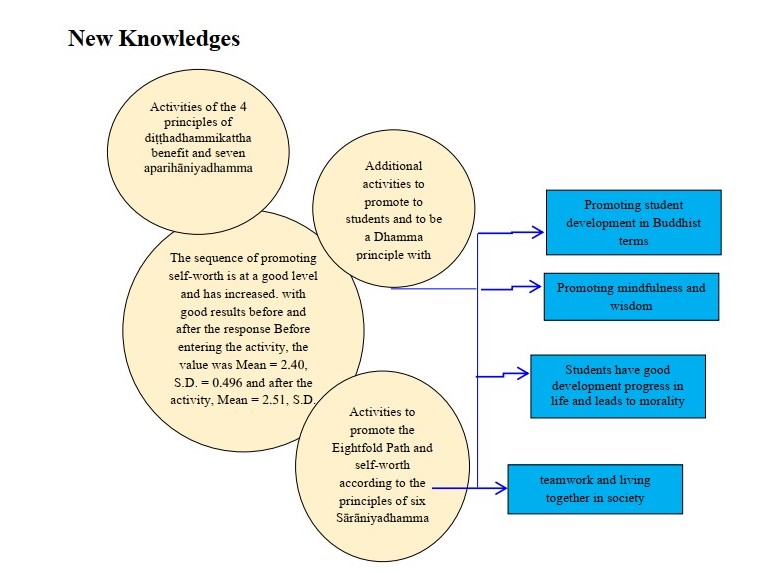Development of Knowledge Promotion for Self-Value Enhancement in Buddhist Perspective of Students at Rai Khing Witthaya School
Main Article Content
Abstract
The research title on “Development of Knowledge Promotion for Self-Value Enhancement in Buddhist Perspective of Students at Rai Khing Witthaya School” Research Objectives: To study the problems and impacts of lack of self-value perception among students. To develop a knowledge promotion set for enhancing self-value perception in students from a Buddhist perspective. To present the knowledge promotion set for enhancing self-value perception in students from a Buddhist perspective. Research Methodology: This research adopts a Mixed Method approach, utilizing Quantitative Research to study a group of students using Rubin's Self Esteem Scale. Purposive Sampling was used to select 47 students from Rai Khing Witthaya School as the sample group. Quantitative data was analyzed for frequency, percentage, mean, and standard deviation, using pretest-posttest measurements and scoring levels ranging from 62-190 according to Theoretical Range of Scores. Qualitative Research was conducted to collect data through analysis of related information and various Buddhist perspective activities, focusing on emotional and behavioral aspects of Grade 9 students.
Results: Analysis of Self-Concept in 30 items revealed a positive trend before development intervention (Mean = 1.40) and a more positive trend after intervention (Mean = 1.89). 2) Analysis of the Self-Esteem Scale's 10 items showed a similar positive trend before (Mean = 1.40) and after (Mean = 1.89) intervention. 3) Analysis of the Self-Esteem Scale's 22 items displayed a positive trend before (Mean = 3.02) and after (Mean = 3.17) intervention. 4) Interview results indicated that students showed improvement in their participation and perceived the activities as effective for personal development. The activities were deemed suitable for daily life application.
Article Details
References
Carol S. Dweck, (2026). Using Thoughts to Overcome Fate, translated by
Pannee Chujirawong, Bangkok: V Publishing Learn, pp. 91,97.
Phra Phromkunaphon (Prayut Payutto) (2021), Strengthening the
Characteristics of Thai Children. 2nd edition, Bangkok: Dhamma Sabha Buddhist Publishing House, 2011, pp. 2-3.
Mayuree Yupawan, (1996) Women and the AIDS Crisis. Bangkok: Soithong,
page, 46.
Supavadee Hanmethee, EF Life Immunity and Drug Prevention Handbook for Kindergarten Children. (2015). Bangkok: Rak Luk Books Publishing House, pp. 91-92.
Saneh Sikawee and Banchob Banaruji, (2022). “Developing the Integrated
Buddhist Learning Process”, Santi Suksa Review MCU, Year 5, Issue 3: p.288.
Cooper Smith, Self-Esteem, (1984). New York: Bantam Books, p. 36-37.
Carl Roger, Self-Theory Self-Theory: Electronic Media and
Telecommunications, [online], source: http://hanan83.blogspot.com/2016/01/6-carl-roger.html [11 May 2020].
National Economic and Social Development Plan No. 12, Children and Youth
What will you get from the development plan? 12: Electronic media and telecommunications, [online], source: http://planning.dld.go.th/th/images/ stories/section-5/2018/strategy09.pdf [11 May 2020].


